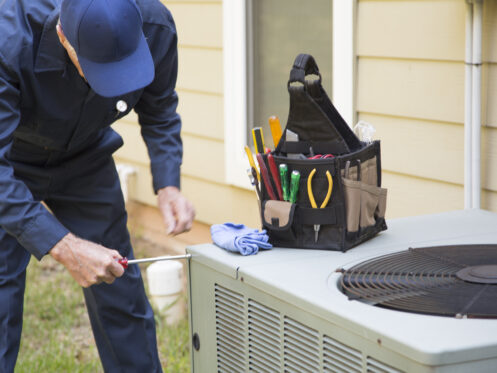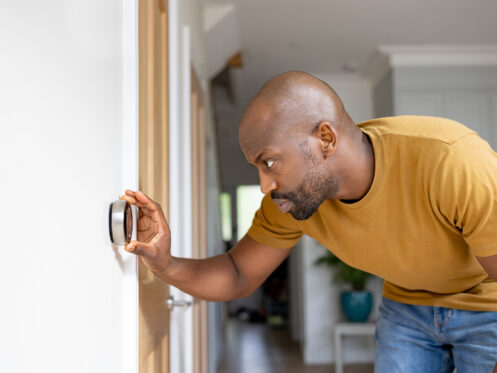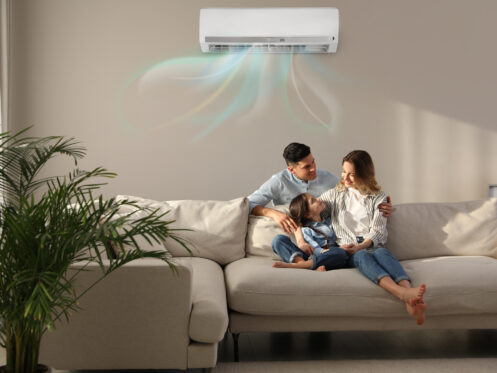One of the greatest decisions that a homeowner will need to make is when to replace an old AC. Although regular maintenance will keep your unit running for a more extended period, even the best AC model won’t last forever. The up-front cost of buying a new AC may seem like a significant investment, but so is running and repairing an old and inefficient unit. Here are some signs that you need a new air conditioning unit.
1. A Spike in Utility Bills
If you notice that it’s getting expensive to run your AC, you need to consider replacing your unit. It could be that the system is working too hard to maintain comfortable indoor conditions, which results in high energy consumption. Always look at your year-over-year energy usage, and if it keeps going up, the system has become less efficient. Upgrading to a new AC will help you save on utility bills in years to come.
2. Foul Smells From the AC
An AC should circulate clean and fresh-smelling air throughout your home. Strange odors mean that the unit is malfunctioning, and you need to prepare for a replacement soon. If your AC emits a burning smell, electrical components in your system like wires, fans, or circuit boards are overheating, and this requires immediate attention. A skunk-like smell indicates a gas leak. When inhaled, the gas can compromise your family members’ health, so you should turn off the unit, evacuate the home, and seek professional assistance.
If your AC produces a smell similar to rotten eggs, it means that there are dead critters trapped within the system. Musty odors indicate water accumulation in the drain pan or lines, which encourages mold and mildew growth. On the other hand, exhaust-like fumes signify a fluid leak. Once you notice any such smells, call an experienced HVAC technician, and they will advise you on the best course of action.
3. Your AC Is Old
AC units last for about 10 to 12 years. When properly maintained, some models can run up to 15 years. If you skip regular maintenance or have the wrong size AC, it might have a shorter lifespan. Also, for those living in a hotter region, you might need to run the AC for a more extended period, so it wears out more quickly. Once the AC reaches the end of its lifespan, some vital components begin to fail, and even if it’s still working correctly, it’s more likely to break down at the worst time.
Older AC models also use the R-22 Freon, and after its phasing out by the federal government, it isn’t easy to get a refill. While you can still choose to add the new refrigerant to your old system, the process is costly. If your AC uses Freon, replace it with a model that uses the R410A refrigerant. Note that newer models also come with added technology. Older units have a seasonal energy efficiency ratio (SEER) rating of 10 and below while most modern ACs have a SEER rating between 13 and 25.
4. The AC Is Not Cooling Your Home Adequately
If the unit appears functional but doesn’t cool the house the way it once did, it might be time to upgrade. This means that the AC is struggling to keep up with the temperature demands. You can resolve the issue by cleaning clogs in the ductwork or coils to allow sufficient airflow. Other causes of inefficient cooling are a wrongly sized or aging unit.
5. There Is Moisture Buildup in the House
The air conditioning unit draws out moisture from the indoor air and releases it to the outside. It then blows cooler and less humid air back into the house. Once the AC begins to lose its efficiency, the evaporator coils lose their ability to draw out moisture. Your home will then start to feel more humid, and you might even see fog on your windows. Such conditions attract mold and mildew growth, triggering asthmatic attacks, allergic reactions, and other illnesses. If your AC can’t maintain the indoor humidity levels within a comfortable range, consider replacing it.
6. You AC Produces Unusual Sounds
Most air conditioners operate at a barely detectable noise level. Once your AC begins to get noisier than it used to be, prepare to get a replacement soon. A banging or clanking noise means that there are loose components within your system. If the AC produces constantly buzzing noise once turned on, metal parts are touching one another or you have dirty condenser coils. High-pitched squealing noises mean that the belt has issues or the compressor is at a high-pressure level. Note that replacing the compressor unit can be very expensive, and you might have to consider getting a new system.
On the other hand, if your AC produces rattling noises, it signifies deterioration due to age. Excessive clicking sounds could mean that you have a defective control interface or thermostat, and screaming noises indicate refrigerant leaks.
7. Frequent Breakdowns
If your air conditioning unit keeps breaking down, it is often more economical to buy a new AC, especially if the system isn’t under warranty. The costs can add up if the repair involves significant components. Next time you plan for a tune-up, ask the technician to give an honest review about the overall functionality of the unit. If it seems like too many parts will require extensive repair in the future, buy a new AC.
8. Your House Seems to Accumulate More Dust
When your furniture and house surfaces begin to accumulate more dust than before, it could signify a problem within the ductwork. Once the ducts develop leaks, the unit begins to lose its efficiency. You might not need to replace such a unit immediately, but start preparing just in case the AC becomes inoperable.
Is it Time to Replace Your AC? Consult a Professional
Having a properly functioning AC in summer is vital for the health and comfort of your family members. Even with regular maintenance, your AC will reach a point when it’s no longer functional. Depending on the nature and age of the unit, you might need to consider a replacement. While replacing an inefficient system may seem rather expensive, it’s worth the cost. A new AC cools your house better and efficiently. It lowers utility bills and increases indoor air quality and comfort levels. Proper installation will also improve efficiency and longevity. Once you decide to replace your AC, it’s a good idea that you consult a professional. They will help you choose the right option based on your house’s square footage, cooling needs, climatic conditions, and the number of occupants.
Once you are ready to upgrade your air conditioning unit, reach out to Buehler Air Conditioning & Plumbing. We provide air conditioner and furnace installation, repair, and maintenance. Our company also provides duct cleaning, dehumidifiers, air purifiers, and services for ductless mini-split systems in Jacksonville, FL, and the surrounding area. Contact us today and book an appointment.



